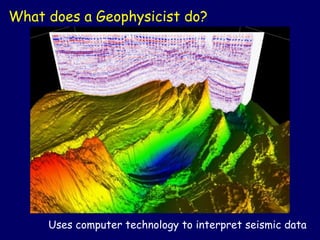All Categories
Featured
Table of Contents
Geophysical Methods in Mount Hawthorn Oz 2020
This work is significantly contracted out, so consultancies provide another source of employment. Consultancy companies differ in size, from really little business to large multinationals. Some consultancies are quite specialised in utilizing specific geophysical strategies or working in particular locations, while others use a more varied variety of services to their clients.
The extraction of gas from land fill websites is another location of employment and this might grow in the future. Exploration companies may carry out work for building and construction firms, public utility, mining companies and ecological companies, so geophysicists may be utilized in any of these settings. Other employers consist of: geological surveysgovernment bodies and agenciesuniversities and research study institutes.


Vacancies may be noted in the oil and gas sector press. Recruitment is affected by oil price changes and the level of competition for positions varies depending on this. Professions Days, which cover the full range of geoscience careers and are usually attended by a number of key industry employers, are run by The Geological Society.
Geophysical Survey in South Guildford Australia 2023
Some of the large oil and gas companies provide a complete two-year structured training programme across the breadth of geophysics, including the opportunity to experience operate in different groups before specialising in one area. Your training may consist of deal with: existing wellsmagnetic and gravitational potential field data analysisresearchrock analysis. However, it's more typical for your initial training to be provided on the job.

There might be a probationary duration during which you work alongside a knowledgeable coworker. Competency-based appraisals happen regularly in the majority of companies. In smaller sized firms, and for academic posts, there is not likely to be any official training - you'll be anticipated to begin work straightaway and get abilities as you go along.
If you work for a smaller business, you might discover that you require to take responsibility for arranging and funding your own advancement and training. If you have a geology degree, subscription of The Geological Society can be useful for networking and for keeping up to date with the market.
Airborne Geophysical Surveys Of The Lower Mississippi ... in Clarkson WA 2022
You may also discover it useful to sign up with the PESGB (The Petroleum Expedition Society of Great Britain, which has a geophysics special interest group. After a probationary period, and when you've acquired some experience, you might advance to senior geophysicist, then team leader and after that into a senior role in management.
The ease of motion in between roles depends on the business structure. Research study at Masters or Ph, D level in a subject related to geophysics or geosciences may assist with your career advancement and progression. The employment market within the oil and gas industry is very dependent on rate and this might affect your chances for profession progression.
Not all jobs are dependent on the oil and gas markets. For skilled geophysicists, freelance consultancy offers a good path for career advancement. You can also specialise in a specific area of geophysics. As a geophysicist, you're most likely to have a number of tasks throughout your working life. International mobility is essential for handling peaks and troughs in various nations at different times.
What Does A Geophysicist Do? in St James Oz 2021
From geophysics, it's possible to focus on seismology (finishing more training to become a seismic interpreter) or to move into associated locations such as engineering geology or danger prediction.
Deciding what to study in college is a difficult option. Even if you understand that your field of interest lies in science, what program of study is ideal for you?
However the initial step to attaining your objective of ending up being a geophysicist is making a degree. Even for entry-level positions in the field of geoscience, you'll require a bachelor's degree (a geophysicist college degree) from an accredited college or university. Some research study positions need prospects to hold master's degrees or even Ph.
Geophysical Surveys in Hocking Australia 2021
Postgraduate degree are especially crucial if you plan to teach at a four-year organization. Geophysicists apply physics ideas and strategies to study the gravitational, magnetic, and electrical fields of the earth. This advances scientists' knowledge of both the world's interior core and its surface area. Geophysicists should have the ability to: analyze rocks, photos, and other pieces of information carry out research study both in the field and in labs produce maps and charts of their findings compose reports To accomplish all this, trainees need a specialized education for geophysicist professions.
As stated above, you'll require a bachelor's degree in geoscience or a related discipline, such as a physical science or a life sciences, to land an entry-level task. Trainees can also prepare by majoring in topics like: Biology Chemistry Computer system science Engineering Mathematics Physics The above geophysicist majors provide a more generalized technique to a single scientific discipline, however many programs need students to take one or more geology course.
Latest Posts
Geophysical Survey Methods in Champion Aus 2021
Geophysical Survey - Salisbury Archaeology in Hocking Australia 2021
What Can I Do With A Major In Geophysics? in Carine Australia 2023